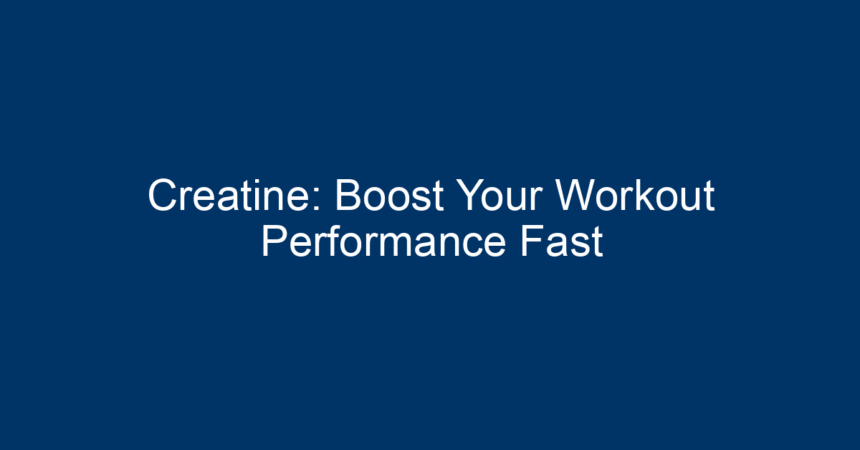In the pursuit of fitness excellence, athletes and gym-goers alike are constantly searching for ways to enhance performance and speed up recovery. One supplement that has gained immense popularity over the years is creatine. Often hailed as a game-changer in the world of fitness, creatine is not just for bodybuilders; it’s for anyone looking to maximize their workout performance. In this article, we will explore the benefits of creatine, how it works, the different types available, proper dosage, and essential tips for getting the most out of this powerful supplement.
What is Creatine?
Creatine is a naturally occurring compound found in small amounts in certain foods and produced by the body, primarily in the liver, kidneys, and pancreas. It is made up of three amino acids: arginine, glycine, and methionine. The majority of creatine in our body is stored in our muscles, where it plays a crucial role in energy production.
How Does Creatine Work?
To understand how creatine can boost workout performance, it’s essential to grasp the concept of ATP (adenosine triphosphate). ATP is the primary energy carrier in our cells. When you engage in high-intensity exercise, your body relies on ATP for energy. However, the supply of ATP is limited and can dwindle quickly during intense workouts. This is where creatine comes in.
Creatine increases the phosphocreatine stores in your muscles, allowing for rapid regeneration of ATP. This means you can perform at a higher intensity for longer periods, leading to increased strength, power, and overall workout performance.
Benefits of Creatine
Creatine offers a myriad of benefits that can significantly enhance your exercise experience. Here are some of the most notable advantages:
1. Enhanced Strength and Power
One of the most compelling reasons athletes use creatine is to improve strength and power output. Studies have consistently shown that supplementing with creatine can lead to significant gains in muscle strength and performance in exercises like weightlifting and sprinting.
2. Improved Exercise Performance
Whether you’re a sprinter, powerlifter, or recreational runner, creatine can enhance your performance. It allows for quicker recovery between sets and higher overall training volume, which can lead to greater muscular adaptations over time.
3. Increased Muscle Mass
Creatine supplementation is also associated with increased muscle mass. It promotes water retention in muscle cells, leading to a fuller appearance. Furthermore, the increased training intensity often leads to muscle growth through hypertrophy.
4. Enhanced Recovery
Creatine may aide in recovery after intense workouts. Its role in cellular energy production can help reduce muscle damage and inflammation, allowing you to bounce back faster from strenuous exercise.
5. Cognitive Benefits
Emerging research suggests that creatine might also support cognitive function, particularly during times of mental fatigue. This can be particularly beneficial for athletes who need sharp focus and quick decision-making during their training and competitions.
Types of Creatine
With several forms of creatine available on the market, choosing the right one can be confusing. Here are the most common types of creatine and their unique features:
1. Creatine Monohydrate
This is the most researched and widely used form of creatine. It is effective, affordable, and well-tolerated by most individuals. Creatine monohydrate helps increase muscle mass, strength, and overall performance.
2. Creatine Ethyl Ester
This form is supposedly more bioavailable, meaning your body can absorb it more efficiently. However, research supporting these claims remains limited.
3. Buffered Creatine
Buffered creatine is designed to minimize the breakdown of creatine in the stomach, which may allow for better absorption. However, like creatine ethyl ester, more research is needed to confirm its advantages over monohydrate.
4. Creatine HCL
Creatine HCL (hydrochloride) is often marketed as a superior form due to its purported solubility and absorption. While some users report less bloating, it typically comes at a higher price point.
Proper Dosage and Timing
Understanding how to take creatine effectively is crucial for maximizing its benefits:
Loading Phase
Some users opt for a loading phase, taking 20 grams per day divided into four doses for 5-7 days. This rapidly saturates the muscles with creatine.
Maintenance Phase
After the loading phase, a daily dose of 3-5 grams is typically sufficient to maintain creatine levels in the muscles.
Timing
Creatine timing can also be essential. Many experts recommend taking it post-workout when insulin sensitivity is heightened, paired with a source of carbohydrates to enhance uptake.
Tips for Maximizing the Benefits of Creatine
To unlock the full potential of your creatine supplementation, consider the following strategies:
1. Stay Hydrated
Creatine can lead to increased water retention in your muscles, so staying adequately hydrated is essential. Make sure to drink plenty of water throughout the day.
2. Combine with Carbs and Protein
When taking creatine, pairing it with a carbohydrate and protein source can enhance its absorption. Foods like a banana with a protein shake or a post-workout meal with high-quality carbs can work well.
3. Consistency is Key
For creatine to be effective, consistency in supplementation is crucial. Make it a part of your daily routine, and don’t skip doses.
4. Monitor Your Response
Everyone’s body responds differently to supplements. Keep track of how your strength and performance change over time, and adjust the dosage if necessary.
Potential Side Effects
While creatine is generally considered safe for most people, a few side effects can occur, including:
- Gastrointestinal discomfort: Some people experience stomach upset when taking creatine, especially during the loading phase.
- Weight Gain: Due to water retention, some users may notice a slight increase in body weight.
- Muscle Cramping: Though not conclusively proven, some athletes report experiencing muscle cramps while supplementing with creatine.
If you’re concerned about these side effects, consult with a healthcare professional before starting supplementation.
Conclusion
Creatine is a powerhouse supplement that can significantly enhance workout performance for both seasoned athletes and casual gym-goers. By increasing strength, boosting recovery, and promoting muscle growth, creatine has proven its worth in the fitness world. When taken correctly and combined with proper nutrition and hydration, it can be an invaluable addition to your workout regimen.
To maximize the benefits, consider starting with creatine monohydrate, monitor your dosage, and be consistent in your supplementation. With creatine in your corner, you can boost your workout performance and achieve your fitness goals faster than ever before. Start today, and witness the transformation firsthand!




